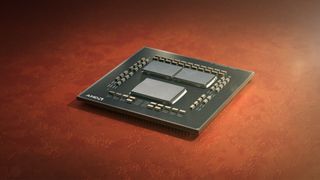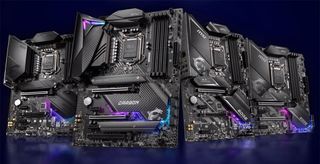AMD on why it didn't go for 5GHz with Ryzen 5000: 'we always want to deliver on our promises'
AMD's Joe Macri talks about why the Ryzen 9 5950X sits at a tantalising close 4.9GHz clock speed but no further.

Ever since we first laid our eyes on the leaked specs of the AMD Ryzen 5000-series processors, we've all been wondering if this generation would see AMD break the 5GHz barrier right out of the box. We now know it does not intend to, even with the Ryzen 9 5950X, but we also know that these chips are capable of such lofty clock speeds. So what gives?
"Well first, we always want to deliver on our promises," AMD's Joe Macri explains during an engineering roundtable. "It's an important thing to build trust with all of our users in the world and, you know, what allows the cores to go to a high frequency is a couple of things.
"One is what we call a voltage frequency curve that is basically associated with each of the cores in the devices. You know, process technology isn't a constant, there's variability on it. Some cores are just going to be better than other cores."
Macri is alluding to the so-called 'silicon lottery', which is born out of the very lithographic process that these processors are built upon. Every wafer contains hundreds of processor chips, each one different, usually in some minor way, to the last. This creates variance, and that variance is what separates the cream of the overclocking crop from those that fall over without a generous serving of voltage.
As Macri explains, AMD wanted to ensure that any given chip will actually hit its rated clock speed in normal operation and under normal operating conditions. Basically, since the Ryzen 9 5900X is rated to 4.8GHz, every chip off the shelf should be able to hit 4.8GHz in use.
Everything is not the same. What you're seeing is variability allows you to punch through what we're promising
Joe Macri, AMD product CTO
What's interesting in the case of the Ryzen 9 5900X is that, in our tests and with a little help from AMD's Precision Boost 2, this chip often teeters on the edge of 5GHz without any overclocking. But as Macri explains, it's not all about the silicon lottery.
"That's one factor. The other is the environment. We're looking at local voltage, local temperature at the transistors. And so effectively if you have a good cooling solution, if the room temperature and the ambient temperature is in a good place, that will allow you to boost higher. Power delivery is another piece. Again, it's not a constant, there's inductance in the path that goes through the package. Everything is not the same. What you're seeing is variability allows you to punch through what we're promising."
The biggest gaming news, reviews and hardware deals
Keep up to date with the most important stories and the best deals, as picked by the PC Gamer team.

Best gaming motherboard: the best boards around
Best AMD motherboard: your new Ryzen's new home
So it's really up to you, and whether your PC build is up to scratch, as to whether you break the 5GHz barrier or not with certain lucky chips. Also what seems clear from Macri's statement is that AMD does not want a rerun of the Ryzen 3000 launch, which saw some users complaining that they were not hitting the advertised boost clocks on some processors.
"But what we wanna do is always deliver on our promises," Macri continues. "So yes, you will go above it and in many cases you'll go above it. And it may not be one core when you go above it, that's the beauty of the system we've built. It's dynamic, it reacts to the environment, and it reacts to the actual transistors that sit on that particular piece of silicon."
So don't be surprised if your brand new Ryzen 5000 chip underperforms or outperforms those of your peers—it's natural, and it shouldn't mean you get less than the advertised speeds even in the worst case scenario. In fact, for those not familiar, the silicon lottery used to be a much bigger deal for CPU performance, where some of the top Intel chips had so much leftover headroom that you could sometimes overclock them by 1GHz and not run into any troubles. Those days are seemingly over now, though, as both Intel and AMD run both their processors to the ragged edge to stay as competitive as possible.
AMD's Ryzen 5000 processors are out right now, and according to retailer predictions they're going to move quick.

Jacob earned his first byline writing for his own tech blog. From there, he graduated to professionally breaking things as hardware writer at PCGamesN, and would go on to run the team as hardware editor. He joined PC Gamer's top staff as senior hardware editor before becoming managing editor of the hardware team, and you'll now find him reporting on the latest developments in the technology and gaming industries and testing the newest PC components.
Most Popular







